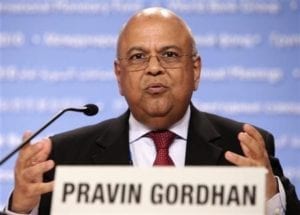Finance Minister Pravin Gordhan has made an unusual appeal to the Constitutional Court in a bid to set aside the high court order halting e-tolling.
“At the heart of the dispute in this case, lies a fundamental issue regarding separation of powers and whether or not a court can exercise discretionary judgment over a governmental policy decision on appropriate funding mechanisms, revenue sources and the allocation of nationally raised revenue,” Gordhan said in court papers. “Citizens who enjoy higher than standard infrastructure ought not, as a matter of policy, to be subsidised by others who do not.” In the affidavit, he warns that South Africa would face a dark economic future if the order was not set aside urgently. According to Beeld newspaper, the appeal application papers were handed to Chief Justice Mogoeng Mogoeng at the Constitutional Court on Tuesday. In a statement on Wednesday, government spokesman Jimmy Manyi said Gordhan was being supported by the Minister of Transport, the Minister of Water and Environmental Affairs, the Gauteng MEC of Roads and Transport and SANRAL. “To prevent further harm to Sanral’s rating and the company’s very existence, government has asked the Constitutional Court to hear the matter urgently, in the second half of July 2012,” said Manyi. Gordhan regarded his request as so urgent that he asked Chief Justice Mogoeng to convene the Constitutional Court during its annual July recess to hear the application. His main objection to the interim court order issued by Judge Bill Prinsloo in the High Court in Pretoria on April 28, was that Prinsloo ignored the constitutional principle of separation of powers. The Opposition to Urban Tolling Alliance (Outa) applied to have e-tolling halted. “The South African government is of the view that Justice Prinsloo’s judgment is an unprecedented intervention in public finance matters and is a fundamental breach of the division of powers as stipulated in the Constitution,” said Manyi. He said Gordhan also pointed out that the equitable division of nationally collected revenue between provinces, which was governed by Constitutional principles, would be compromised by a replacement of toll revenue with general government support. “Furthermore, this uncertainty could hurt the ability of other state-owned enterprises such as Eskom and Transnet to access capital markets, jeopardising the implementation of government’s wide-scale infrastructure projects,” said Manyi.Business Day newspaper reported it was an unusual move for Gordhan and his colleagues to approach the Constitutional Court directly, rather than appealing to the High Court.
In the affidavit Gordhan said South Africa would have to brace itself for negative international credit ratings. Essential services to schools, hospitals and roads would be adversely affected if the temporary court order remained in place until a revision process, and the subsequent appeals, were concluded. He said treasury would not be able to do any long-term planning if the courts issued orders derailing the planning process. It was imperative that the Constitutional Court considered the matter to “determine the limits of this kind of judicial intervention”, Gordhan said. Outa spokesman Wayne Duvenhage told Sapa that the court papers had been lodged. “Their [government’s] argument is based around its right to introduce policy that it deems appropriate. If they can’t do that, then they say it could damage the country’s economy. “We are arguing that it is not the court interdict that is the issue, it is about the poor decisions around e-tolling. Government cannot introduce policies that are oppressive on the country’s people. Policies need to be reasonable,” he said. The other applicants in the case are the transport department, Gauteng’s roads and transport MEC, the water and environment affairs department and its director general. The High Court order prevents SANRAL from levying or collecting e-tolls pending the outcome of a judicial review. Source: timeslive







